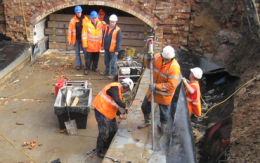Posted 11th August 2010 | 1 Comment
Network Rail under fire over 'lost' accidents

A ROW is brewing over the way that accidents affecting Network Rail staff are being reported, amid allegations that some are being concealed. As many as 2,500 minor injuries may have been missed out of the statistics in the last year.
It has been suggested that the problem could be related to senior management bonuses, because these are affected by the level of accidents in the company, although Network Rail does not accept that there is any connection.
Accidents and other medical problems related to work are supposed to be recorded and notified under RIDDOR -- the Reporting of Injuries, Diseases and Dangerous Occurrences Regulations -- and collated regularly.
But the company's Annual General Meeting on 21 July passed a resolution by 71 per cent which regretted the 'under reporting' of RIDDOR-related incidents by Network Rail.
The resolution came from Bob Rixham, the national railway officer of the UNITE union, who is one of Network Rail's members.
The union has just reached a deal with Hitachi to represent staff working at the Class 395 High Speed train maintenance depot in Ashford, but has been increasing its membership in other parts of the railway industry in recent years.
In a letter written by Network Rail chief executive Iain Coucher to Mr Rixham before this year's AGM, Mr Coucher conceded that there had been some under-reporting of RIDDOR incidents. He pointed out that the general Accident Frequency Rate has been falling sharply in recent years, since thousands of workers had been brought in-house from previous employment with contractors, but also accepted that the rate of major injury accidents had increased.
He attributed any under-reporting of 'lost time' accidents to staff returning to work on light duties, and also to workers who had pre-existing conditions. Staff returning on light duties should still be reported under RIDDOR, but Mr Coucher admitted that there had been a 'misunderstanding' at local level about this. He also agreed that there had also been some confusion about pre-existing conditions, which are known to be a grey area of the regulations.
Meanwhile, Mr Rixham pointed out that an investigation by the Office of Rail Regulation has revealed further problems. It said Network Rail managers had applied an 'obscure' and 'wrong' interpretation of the 'three day' rule, under which staff who have injuries or a disease that prevents them working normally for more than three days must be reported.
Mr Coucher said the findings of the ORR review would be discussed, but pledged an 'unswerving commitment' to improve the safety performance of Network Rail.
Mr Rixham's response was that he was not convinced. He told his fellow members: “Network Rail claims to have an ever improving safety record. It would seem that this is due in part to accidents not being reported.”
He added: “If we as members are to hold the board to account over health and safety, then there must be greater dialogue and transparency from both Network Rail and the ORR.”
Another member, Lord Tony Berkeley, commented after the AGM: “Network Rail suggested that the under reporting was down to one local manager, but the evidence was otherwise, with likely under-reporting of some 2,500 minor injuries in 2009/10 using the standard ratio of major to minor injuries. The worry of course is that this was a consistent policy encouraged or ‘allowed’ across the company because fewer accident reports meant bigger bonuses.”
The bonuses themselves also attracted criticism from members. Lord Berkeley suggested that Network Rail was in the 'last chance saloon' over rewards for directors.
He said Network Rail must 'respond positively' to calls for restraint, possibly scrapping bonuses altogether. He also said the company should: “offer a further 20% efficiency saving over the current four year control period on top of the ORR requirement, and stop arguing with the ORR about whether they are achieving existing targets, all without affecting performance and safety. Certainly many outside NR involved in the McNulty Value for Money study think this is achievable.”
• Sir Roy McNulty is to be a key speaker at the Derby and Derbyshire Rail Forum Conference on 4 November.
Reader Comments:
Views expressed in submitted comments are that of the author, and not necessarily shared by Railnews.

Ben Oldfield, Kilkenny, Ireland
In general there should be 10 near misses for every minor accident and 10 minor accidents for every lost time accident. The only way to stop lost time accidents and fatalities is to report the near misses and minor accidents so you can engineer out the causes. This is the only way to reduce serious accidents and fatalities. This is the system that has been used in Europe with significant success. You only have to watch Aircrash Investigation on Sky to see that all major accidents are caused by small mistakes.